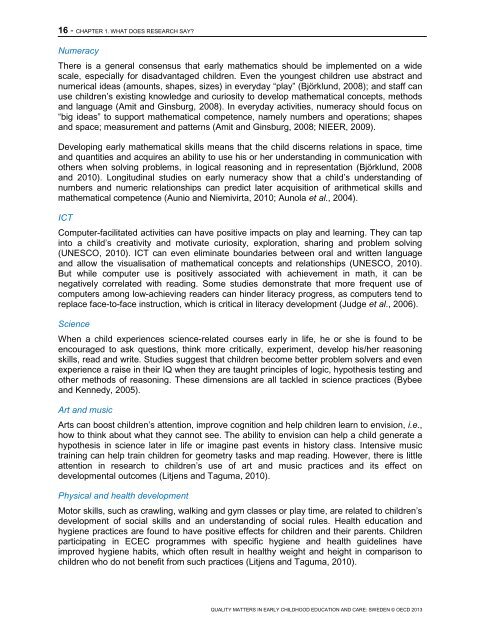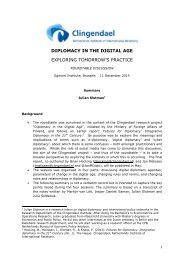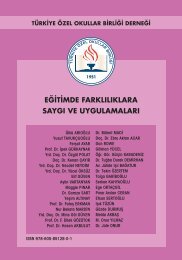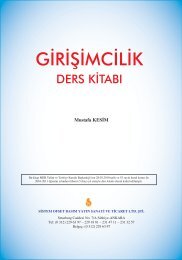SWEDEN%20policy%20profile%20-%20published%2005-02-2013
SWEDEN%20policy%20profile%20-%20published%2005-02-2013
SWEDEN%20policy%20profile%20-%20published%2005-02-2013
You also want an ePaper? Increase the reach of your titles
YUMPU automatically turns print PDFs into web optimized ePapers that Google loves.
16 - CHAPTER 1. WHAT DOES RESEARCH SAY?<br />
Numeracy<br />
There is a general consensus that early mathematics should be implemented on a wide<br />
scale, especially for disadvantaged children. Even the youngest children use abstract and<br />
numerical ideas (amounts, shapes, sizes) in everyday “play” (Björklund, 2008); and staff can<br />
use children’s existing knowledge and curiosity to develop mathematical concepts, methods<br />
and language (Amit and Ginsburg, 2008). In everyday activities, numeracy should focus on<br />
“big ideas” to support mathematical competence, namely numbers and operations; shapes<br />
and space; measurement and patterns (Amit and Ginsburg, 2008; NIEER, 2009).<br />
Developing early mathematical skills means that the child discerns relations in space, time<br />
and quantities and acquires an ability to use his or her understanding in communication with<br />
others when solving problems, in logical reasoning and in representation (Björklund, 2008<br />
and 2010). Longitudinal studies on early numeracy show that a child’s understanding of<br />
numbers and numeric relationships can predict later acquisition of arithmetical skills and<br />
mathematical competence (Aunio and Niemivirta, 2010; Aunola et al., 2004).<br />
ICT<br />
Computer-facilitated activities can have positive impacts on play and learning. They can tap<br />
into a child’s creativity and motivate curiosity, exploration, sharing and problem solving<br />
(UNESCO, 2010). ICT can even eliminate boundaries between oral and written language<br />
and allow the visualisation of mathematical concepts and relationships (UNESCO, 2010).<br />
But while computer use is positively associated with achievement in math, it can be<br />
negatively correlated with reading. Some studies demonstrate that more frequent use of<br />
computers among low-achieving readers can hinder literacy progress, as computers tend to<br />
replace face-to-face instruction, which is critical in literacy development (Judge et al., 2006).<br />
Science<br />
When a child experiences science-related courses early in life, he or she is found to be<br />
encouraged to ask questions, think more critically, experiment, develop his/her reasoning<br />
skills, read and write. Studies suggest that children become better problem solvers and even<br />
experience a raise in their IQ when they are taught principles of logic, hypothesis testing and<br />
other methods of reasoning. These dimensions are all tackled in science practices (Bybee<br />
and Kennedy, 2005).<br />
Art and music<br />
Arts can boost children’s attention, improve cognition and help children learn to envision, i.e.,<br />
how to think about what they cannot see. The ability to envision can help a child generate a<br />
hypothesis in science later in life or imagine past events in history class. Intensive music<br />
training can help train children for geometry tasks and map reading. However, there is little<br />
attention in research to children’s use of art and music practices and its effect on<br />
developmental outcomes (Litjens and Taguma, 2010).<br />
Physical and health development<br />
Motor skills, such as crawling, walking and gym classes or play time, are related to children’s<br />
development of social skills and an understanding of social rules. Health education and<br />
hygiene practices are found to have positive effects for children and their parents. Children<br />
participating in ECEC programmes with specific hygiene and health guidelines have<br />
improved hygiene habits, which often result in healthy weight and height in comparison to<br />
children who do not benefit from such practices (Litjens and Taguma, 2010).<br />
QUALITY MATTERS IN EARLY CHILDHOOD EDUCATION AND CARE: SWEDEN © OECD <strong>2013</strong>








